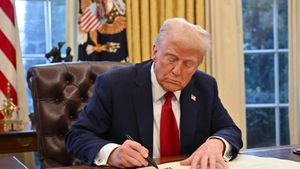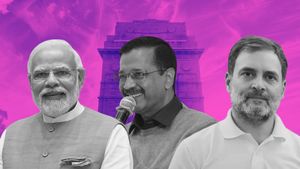The 2025 Delhi Assembly Election results have set the stage for potential political shifts as counting continues, with the Bharatiya Janata Party (BJP) maintaining a solid lead over the ruling Aam Aadmi Party (AAP). Early reports indicate BJP’s dominance, precariously challenging AAP's efforts to secure a fourth consecutive term.
Manish Sisodia, AAP’s deputy chief minister, conceded defeat following significant early results, marking this election as pivotal for the party's future. "We aimed for the stars, but the skies were not clear today," Sisodia remarked, reflecting the abrupt decline after initial leads.
Counting began at 8 am across 19 stations, with notable constituencies like Kalkaji and Jangpura quickly attracting attention. Delhi's Chief Minister, Arvind Kejriwal, was initially trailing behind his BJP rival, Parvesh Verma, which raised questions about the AAP's voter support this election. Kejriwal struggled to gain momentum, trailing by thousands of votes throughout several counting rounds.
Historically, this election appears to mirror trends from previous years. According to the Election Commission, voter turnout stood at 60.54%, showing slight fluctuations compared to previous years. For example, the turnout was 61.60% during the 2020 Assembly elections and had recorded similar high percentages over the last decade.
Specific constituency results indicate significant leads for the BJP. For example, BJP’s Vijender Gupta is reported to have maintained his lead comfortably over the AAP candidate, confirming expectations of BJP's resurgence across Delhi. Meanwhile, AAP’s Atishi faced challenges as she trailed behind BJP’s Ramesh Bidhuri.
Overall, BJP is projected to lead at least 47 seats, leaving AAP at around 23, igniting debates over the possible political restructuring needed should these trends result finally come to fruition.
Ironically, the Congress party has been unable to capitalize on the discontent among residents, as they struggle to gain traction, holding less than one seat at this time of counting.
The mixed sentiments among Delhi's electorate have been attributed to various factors including dissatisfaction against government policies, inflation, and key allegations against the AAP candidates attempting to gain votes through questionable methods. Political tension escalated outside the AAP headquarters as officials from the Anti-Corruption Branch (ACB) arrived to investigate bribery accusations against Kejriwal’s party, highlighting the serious ramifications of this electoral battle.
This year's election is significant not just for the immediate results, but also it could catalyze long-term shifts within Delhi’s political structure, particularly as BJP candidates assert their presence across previously AAP-dominated constituencies.
Looking forward, many are speculating on BJP’s possible Chief Ministerial candidate, as the party moves to establish its governance structure should it take power from AAP. Might former Delhi BJP leader or newly elected aspirants emerge as contenders for the CM position?
Election analysis and trends indicate the voters of Delhi are ready for change, and the political scene remains dynamic as results are tallied and verified. A disappointing outcome for AAP may lead to significant repositioning within their party, especially as it weighs its strategic approaches moving forward.
This election also reflects growing disillusionment among voters, amplifying virulent debates over governance and party loyalty, and raises questions about the AAP's once-unassailable hold on Delhi.
With results still being counted, both parties remain ready for tomorrow's revelations and ultimate seat finalizations. For now, the BJP seems poised to reclaim power after 26 years, fundamentally shifting the sociopolitical fabric of the metropolis.
It is evident this election will leave lasting impressions, not only shaping the immediate political result but also influencing future electoral contests across the spectrum of India. Observers are awaiting which political tides will emerge from this tumultuous election year.



